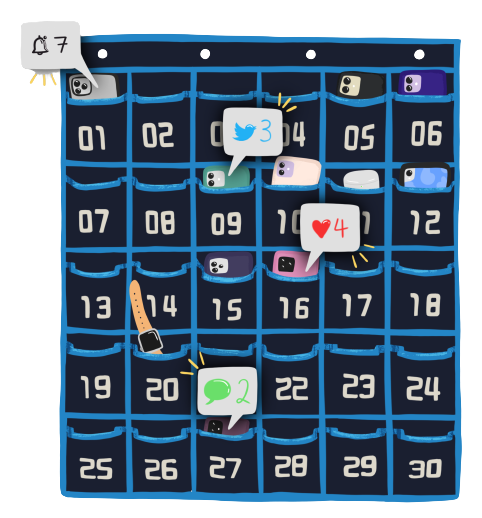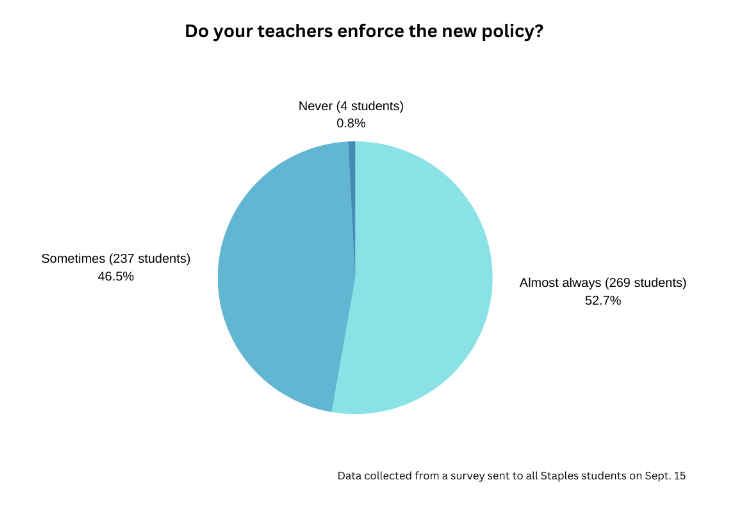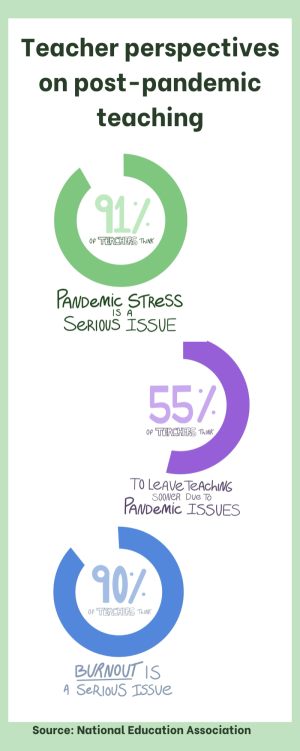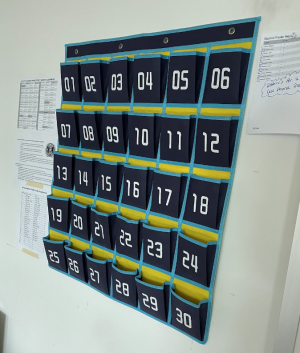Administration introduces, enforces new personal device policy

Graphic by Shivali Kanthan ‘24
As of the 2022-2023 school year, students will store their phones in holders for each class period.
Superintendent Thomas Scarice announced on Aug. 25 the enforcement of a new cell phone policy for all Staples classrooms. This policy requires all students to submit their personal devices—such as AirPods, earbuds, cell phones and smartwatches—to a designated slot in the classroom’s phone holder sleeves during instruction time.
Outside of class, students are permitted to use their devices, including before or after school, between classes, in the hallways, during free periods and in the cafeteria. However, cell phone usage during class time is up to the individual teacher’s discretion, should they find it pertinent to a lesson or activity.
According to an Aug. 26 email sent by Principal Stafford W. Thomas Jr., the purpose of this initiative is to ensure that students are “engaged in classroom activities and assignments” as well as foster less dependency on electronics to complete work, enable greater communication and collaboration among students and decrease distractions during class.
“There is a need to create blocks of time where students can rebuild their attentional skills and experience the full value of connected social interaction,” Thomas said.
According to Thomas, this policy had been in place for several years, but was only enforced in some classrooms. A survey sent out to all Staples faculty on Sept. 15 found that just over 18% of 71 respondents reported that they had collected cell phones and other devices during class in prior years, and additional 39.4% of respondents said that they had occasionally collected devices. Unlike former years, this school year marks the first year in which all classrooms are required to abide by the policy, particularly due to a district-wide effort to return to normalcy with the decline of the COVID-19 pandemic.
“There is a focus on rebuilding our school climate and culture across the entire system,” Scarice said. “The focus is on bringing the humanity back to our schools [and] our classrooms. Minimizing technology and its distractions supports these efforts.”
Scarice said that a team of faculty and administrators largely built the policy and decided to not pursue a full “ban” on technology, but rather a reshaping of technology usage in the classroom. This “healthier approach to technology,” as described by Scarice, was studied and ready to be implemented in 2019, but was ultimately postponed by the pandemic.
A majority of Staples teachers are in favor of the policy. 87.3% of faculty respondents reported that they support the policy and believe it is necessary, in contrast to the 82.4% of 510 students surveyed on Sept. 15 who stated that they do not support it.
Furthermore, over 66% of student respondents reported that they do not feel less distracted or more engaged during class at all, and an additional 23% of respondents said that they only feel somewhat more engaged.
Some students simply believe the protocols themselves are arbitrary.
“The phone holders are not necessary,” Dhilan Patel ’26 said. “A backpack is a sufficient place to store them.”
Other students, such as Jeffrey Pogue ’23, initially disagreed with the policy, but have grown to support it.
“In the beginning, I thought [the policy] was the most ridiculous thing in the world,” Pogue said. “So, I wanted to match its ridiculousness—and maybe get by without handing in my phone—by using a $2 landline I bought at Goodwill. It was only for the joke though, and genuinely, I think the [policy] has been good for me […] giving teachers the power and clear pretext to take away phones on sight has been probably beneficial, overall.”
Poll results by Julia Herlyn ’23

Editor-in-Chief Julia Herlyn ’23 enjoys music. She’s been playing violin for nine years both in school with the Symphonic Orchestra and Chamber Orchestra...

















































